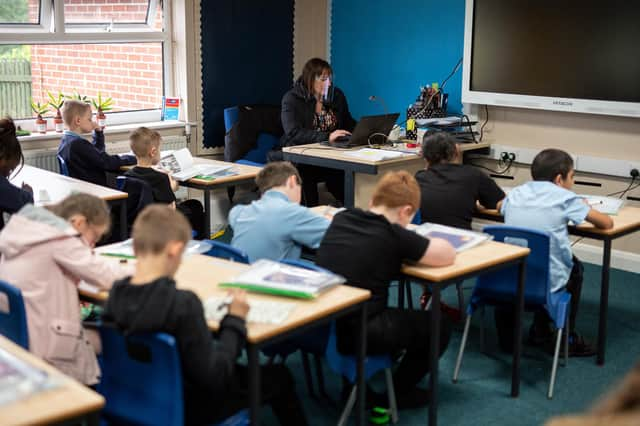Education in Scotland: Just half of probationary primary school teachers have been given a job. We need to employ them all – Cameron Wyllie


Joking, obviously, but still, the Scottish Government’s performance on this vital area of our national interest – affecting our children, their mental health, their future, their capacity to cope with an ageing population, the Scottish economy, independent or otherwise, etc – just becomes poorer and poorer and again I return to the question, who is advising the Cabinet Secretary for Education and her colleagues?
So, to quote Macduff, “What’s the latest grief?” Well, here – in case you aren’t already reeling from it – is a new absurdity, and I don’t use that word lightly.
Advertisement
Hide AdAdvertisement
Hide AdAs you may know, every trainee teacher in Scotland, on completing their teacher training – “teacher education” in 2022 – is entitled to one probationary year teaching in a Scottish state school, for which they are appropriately paid and, often, very well supported by colleagues in schools, anxious to ensure that our new young teachers are as well prepared for their careers as possible.
When I was a head, nothing pleased me more than to tell probationers and teaching students that teaching – if you can do it – is a great job.
Anyway, enough of the golden glow of nostalgia; the news is that of this past year’s probationer primary school teachers, only 50 per cent have been employed in Scotland’s primary schools for this session which has just started.
Half of them have failed to find work. By comparison, the figure for last year was 77 per cent. Just think about that: you are a graduate; by demonstrating your skills, intelligence and commitment, you get into teacher training; you pass these arduous courses (not the much easier year my generation had); then you are allocated your probationary school.
You start your career, you get to know the kids, their parents, your colleagues, to hone your classroom practice, but at the end of that hopefully glorious and assuredly exhausting school year, half of you fail in the scramble for jobs. It’s a disgrace.
These figures incidentally, come from something called the Scottish Government’s “Teacher Workforce Planning Advisory Group”. It is my profound hope that this group, in giving its advice concerning the planning of the teacher workforce, did not suggest dumping half of our new primary teachers just at the point they are mustard keen to embark on their professional life.
This would be bad enough at any time, this waste, but it is astonishing here today at start of session 2022-23. We do not, in truth, yet know what the full impact of decisions regarding schools taken during the pandemic will be, but we do know that the educational progress of many, if not most, children will have been deleteriously affected.
These decisions themselves are spilt milk, consigned to history, but colleagues in all schools – primary and secondary, state and independent – are dealing with the results. Just to name a few: chronic absenteeism; poor behaviour; issues with children’s personal well-being; difficulties in social interaction etc.
Advertisement
Hide AdAdvertisement
Hide AdWe know that a significant portion of the teaching profession in Scotland is thinking of leaving; we know that teachers have never faced such levels of stress. I cannot be alone in thinking that this isn’t the moment to fail to recruit all of the trained teachers coming out of their probation.
Split those big classes; diminish the number of classes with children from more than one year-group; have trained teachers sitting with individuals or groups who need special help; have a trained teacher in every school ready to provide cover, both for absent colleagues and to allow for enriched time for senior colleagues to consider the way forward through the difficult session ahead.
Assume that’s the start of a list of a hundred useful things these energised young teachers could do. I’m just thinking this – if I hadn’t immediately got a job when I qualified as a teacher – it was easy to get jobs then – I might well have done something else altogether. We should not be taking that risk today.
So there’s the pandemic – that very obvious elephant in the room. And standing next to it, fresh from extinction, is the woolly mammoth of the poverty-related attainment gap.
Everyone knows that the children worst affected by these lengthy school closures were the most deprived children. And yet here we are, turning away fresh new blood from our schools that could be used in the specific tuition of these children.
This is supposed to be the number one aim of the Scottish Government at the moment: a practical strategy, with a human backbone, to help young people escape disadvantage and ignorance through education, through their school. And yet hundreds of young teachers are denied the opportunity to help.
Oh yes, money! Well, sorry to sing the same song over and over but the cost of Education Scotland (what’s it for – nobody knows) would cover it easily, with cash to spare.
It’s time for the First Minister who promised in 2015 that this was what her government could be judged by, to get a handle on schools, and a great start would be to employ every teacher who completed their probationary year last session. With apologies to teachers of physics everywhere, this is not rocket science.
Cameron Wyllie writes a blog called A House in Joppa. His book, Is There A Pigeon in the Room? My Life in Schools, is published by Birlinn.
Comments
Want to join the conversation? Please or to comment on this article.
